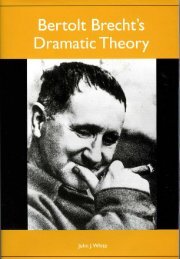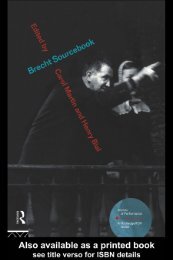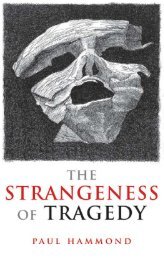- Page 2 and 3:
Bloom’s Modern Critical ViewsAfri
- Page 4 and 5:
Bloom’s Modern Critical ViewsWILL
- Page 6 and 7:
ContentsEditor’s NoteviiIntroduct
- Page 8 and 9:
Editor’s NoteThis volume seeks to
- Page 10:
Editor’s NoteixLanham proposes an
- Page 13 and 14:
2Harold Bloomof omission as it is o
- Page 15 and 16:
4Harold Bloomknowledge, and nausea
- Page 17 and 18:
6Harold Blooma potential playwright
- Page 20 and 21:
FRANK O’CONNORMasterpiecesWith Ro
- Page 22 and 23:
Masterpieces 11Like all actors, Sha
- Page 24 and 25:
Masterpieces 13offense is not that
- Page 26 and 27:
E. PEARLMANThe Invention of Richard
- Page 28 and 29:
The Invention of Richard of Glouces
- Page 30 and 31:
The Invention of Richard of Glouces
- Page 32 and 33:
The Invention of Richard of Glouces
- Page 34 and 35:
The Invention of Richard of Glouces
- Page 36 and 37:
The Invention of Richard of Glouces
- Page 38 and 39:
The Invention of Richard of Glouces
- Page 40 and 41:
The Invention of Richard of Glouces
- Page 42 and 43:
The Invention of Richard of Glouces
- Page 44 and 45:
The Invention of Richard of Glouces
- Page 46 and 47:
The Invention of Richard of Glouces
- Page 48 and 49:
The Invention of Richard of Glouces
- Page 50:
The Invention of Richard of Glouces
- Page 53 and 54:
42Erich Segalepisodes or errors, th
- Page 55 and 56:
44Erich SegalWater isn’t more lik
- Page 57 and 58:
46Erich SegalYet hers is a voice of
- Page 59 and 60:
48Erich SegalShakespeare employs si
- Page 61 and 62:
50Erich SegalBut in the Comedy of E
- Page 63 and 64:
52Erich SegalAnd every one doth cal
- Page 65 and 66:
54Erich SegalTo Plautus’ simple r
- Page 67 and 68:
56Erich Segal2. Harold Bloom, Shake
- Page 69 and 70:
58Erich Segal52. Ibid., 3.2.143.53.
- Page 71 and 72:
60Harold Bloomat the high cost of a
- Page 73 and 74:
62Harold BloomThat stops my way in
- Page 75 and 76:
64Harold BloomTo watch the night in
- Page 78 and 79:
THOMAS M. GREENELove’s Labour’s
- Page 80 and 81:
Love’s Labour’s Lost: The Grace
- Page 82 and 83:
Love’s Labour’s Lost: The Grace
- Page 84 and 85:
Love’s Labour’s Lost: The Grace
- Page 86 and 87:
Love’s Labour’s Lost: The Grace
- Page 88 and 89:
Love’s Labour’s Lost: The Grace
- Page 90 and 91:
Love’s Labour’s Lost: The Grace
- Page 92 and 93: Love’s Labour’s Lost: The Grace
- Page 94 and 95: Love’s Labour’s Lost: The Grace
- Page 96 and 97: HAROLD C. GODDARDThe Meaning of Sha
- Page 98 and 99: The Meaning of Shakespeare: Romeo a
- Page 100 and 101: The Meaning of Shakespeare: Romeo a
- Page 102 and 103: The Meaning of Shakespeare: Romeo a
- Page 104 and 105: The Meaning of Shakespeare: Romeo a
- Page 106 and 107: The Meaning of Shakespeare: Romeo a
- Page 108 and 109: The Meaning of Shakespeare: Romeo a
- Page 110 and 111: The Meaning of Shakespeare: Romeo a
- Page 112 and 113: The Meaning of Shakespeare: Romeo a
- Page 114 and 115: The Meaning of Shakespeare: Romeo a
- Page 116 and 117: The Meaning of Shakespeare: Romeo a
- Page 118 and 119: The Meaning of Shakespeare: Romeo a
- Page 120 and 121: G.K. CHESTERTONA Midsummer Night’
- Page 122 and 123: A Midsummer Night’s Dream 111cann
- Page 124 and 125: A Midsummer Night’s Dream 113pers
- Page 126 and 127: A Midsummer Night’s Dream 115aest
- Page 128 and 129: NORTHROP FRYEThe Bolingbroke Plays(
- Page 130 and 131: The Bolingbroke Plays 119that time
- Page 132 and 133: The Bolingbroke Plays 121nature and
- Page 134 and 135: The Bolingbroke Plays 123that his o
- Page 136 and 137: The Bolingbroke Plays 125successful
- Page 138 and 139: The Bolingbroke Plays 127By being s
- Page 140 and 141: The Bolingbroke Plays 129made so ma
- Page 144 and 145: A.C. BRADLEYThe Rejection of Falsta
- Page 146 and 147: The Rejection of Falstaff 135roarin
- Page 148 and 149: The Rejection of Falstaff 137humoro
- Page 150 and 151: The Rejection of Falstaff 139that h
- Page 152 and 153: The Rejection of Falstaff 141Shakes
- Page 154 and 155: The Rejection of Falstaff 143offere
- Page 156 and 157: The Rejection of Falstaff 145forty
- Page 158 and 159: The Rejection of Falstaff 147and to
- Page 160 and 161: The Rejection of Falstaff 149but ot
- Page 162 and 163: JOSEPH WESTLUNDThe Merchant of Veni
- Page 164 and 165: The Merchant of Venice: Merging wit
- Page 166 and 167: The Merchant of Venice: Merging wit
- Page 168 and 169: The Merchant of Venice: Merging wit
- Page 170 and 171: The Merchant of Venice: Merging wit
- Page 172 and 173: The Merchant of Venice: Merging wit
- Page 174 and 175: The Merchant of Venice: Merging wit
- Page 176 and 177: The Merchant of Venice: Merging wit
- Page 178 and 179: BARBARA EVERETTMuch Ado About Nothi
- Page 180 and 181: Much Ado About Nothing: the unsocia
- Page 182 and 183: Much Ado About Nothing: the unsocia
- Page 184 and 185: Much Ado About Nothing: the unsocia
- Page 186 and 187: Much Ado About Nothing: the unsocia
- Page 188 and 189: Much Ado About Nothing: the unsocia
- Page 190 and 191: Much Ado About Nothing: the unsocia
- Page 192 and 193:
WILLIAM HAZLITTShakespeare’s Char
- Page 194 and 195:
Shakespeare’s Characters: Henry V
- Page 196 and 197:
Shakespeare’s Characters: Henry V
- Page 198 and 199:
Shakespeare’s Characters: Henry V
- Page 200 and 201:
Shakespeare’s Characters: Henry V
- Page 202 and 203:
Shakespeare’s Characters: Henry V
- Page 204 and 205:
Shakespeare’s Characters: Henry V
- Page 206:
Shakespeare’s Characters: Henry V
- Page 209 and 210:
198David Quintbasis for a dialogue
- Page 211 and 212:
200David Quintales and his cups, so
- Page 213 and 214:
202David QuintFor in his books he c
- Page 215 and 216:
204David QuintThe sentiment that Ch
- Page 217 and 218:
206David Quintformal panegyric and
- Page 219 and 220:
208David Quintthought which followe
- Page 221 and 222:
210David Quintas in the very readin
- Page 223 and 224:
212David Quintfrom the experience o
- Page 225 and 226:
214David QuintErasmians would empha
- Page 227 and 228:
216David Quint(p. xxiii). For a bal
- Page 229 and 230:
218Lawrence Dansonexperience.” 2
- Page 231 and 232:
220Lawrence DansonI can as well be
- Page 233 and 234:
222Lawrence Dansonwho is the play
- Page 235 and 236:
224Lawrence DansonAntony, pointedly
- Page 237 and 238:
226Lawrence Dansonbetween symbol an
- Page 239 and 240:
228Lawrence DansonMore than Octaviu
- Page 242 and 243:
JAMES P. BEDNARZAs You Like It and
- Page 244 and 245:
As You Like It and the Containment
- Page 246 and 247:
As You Like It and the Containment
- Page 248 and 249:
As You Like It and the Containment
- Page 250 and 251:
As You Like It and the Containment
- Page 252 and 253:
As You Like It and the Containment
- Page 254 and 255:
As You Like It and the Containment
- Page 256 and 257:
As You Like It and the Containment
- Page 258 and 259:
As You Like It and the Containment
- Page 260 and 261:
As You Like It and the Containment
- Page 262 and 263:
As You Like It and the Containment
- Page 264 and 265:
As You Like It and the Containment
- Page 266 and 267:
As You Like It and the Containment
- Page 268 and 269:
As You Like It and the Containment
- Page 270 and 271:
As You Like It and the Containment
- Page 272 and 273:
As You Like It and the Containment
- Page 274 and 275:
JOHN HOLLANDERTwelfth Nightand the
- Page 276 and 277:
Twelfth Night and the Morality of I
- Page 278 and 279:
Twelfth Night and the Morality of I
- Page 280 and 281:
Twelfth Night and the Morality of I
- Page 282 and 283:
Twelfth Night and the Morality of I
- Page 284 and 285:
Twelfth Night and the Morality of I
- Page 286 and 287:
Twelfth Night and the Morality of I
- Page 288 and 289:
RICHARD A. LANHAMSuperposed Plays:H
- Page 290 and 291:
Superposed Plays: Hamlet 279reflect
- Page 292 and 293:
Superposed Plays: Hamlet 281English
- Page 294 and 295:
Superposed Plays: Hamlet 283the poe
- Page 296 and 297:
Superposed Plays: Hamlet 285Excitem
- Page 298:
Superposed Plays: Hamlet 287Shakesp
- Page 301 and 302:
290Patricia Parkercomedy, All’s W
- Page 303 and 304:
292Patricia Parkerappears to emphas
- Page 305 and 306:
294Patricia Parkerthe surrogate dea
- Page 307 and 308:
296Patricia ParkerHe must not be my
- Page 309 and 310:
298Patricia Parkerthat phrase. In t
- Page 311 and 312:
300Patricia Parkerall demands.” T
- Page 313 and 314:
302Patricia Parkeror intended last
- Page 315 and 316:
304Patricia Parkerof a farewell; an
- Page 317 and 318:
306Patricia Parkeranswer is linked
- Page 319 and 320:
308Patricia ParkerWhy then to-night
- Page 321 and 322:
310Patricia Parkerpossible to go to
- Page 323 and 324:
312Patricia ParkerThe plot is the s
- Page 325 and 326:
314Patricia Parkersummoning of this
- Page 327 and 328:
316Patricia ParkerLipsius (a model
- Page 329 and 330:
318Patricia Parker“abatements and
- Page 331 and 332:
320Patricia Parkerthe high stile is
- Page 333 and 334:
322Patricia Parkerlinked by image t
- Page 335 and 336:
324Patricia Parkera simulacrum of g
- Page 337 and 338:
326Patricia Parkererotic politics s
- Page 339 and 340:
328Patricia Parker11. Hunter (13n),
- Page 341 and 342:
330Patricia Parkerin Women, History
- Page 343 and 344:
332Patricia Parkerof the mechanical
- Page 345 and 346:
334Patricia Parker1969), 279-80; Li
- Page 347 and 348:
336Patricia Parker51. For the above
- Page 349 and 350:
338Patricia Parker60. On “plurisy
- Page 351 and 352:
340Patricia Parkeracquired matter f
- Page 353 and 354:
342Patricia Parkerverbosus crocitab
- Page 355 and 356:
344Ronald R. Macdonaldsimply becomi
- Page 357 and 358:
346Ronald R. MacdonaldLike rats tha
- Page 359 and 360:
348Ronald R. MacdonaldIt is an indi
- Page 361 and 362:
350Ronald R. MacdonaldThis will las
- Page 363 and 364:
352Ronald R. Macdonaldconfusion, Is
- Page 365 and 366:
354Ronald R. Macdonaldbegun to gras
- Page 367 and 368:
356Ronald R. MacdonaldMost bounteou
- Page 369 and 370:
358Ronald R. Macdonald16. For a tem
- Page 371 and 372:
360Graham BradshawCinthio’s in th
- Page 373 and 374:
362Graham BradshawAnd of course in
- Page 375 and 376:
364Graham Bradshawit a shape and fo
- Page 377 and 378:
366Graham BradshawTheir deerest act
- Page 379 and 380:
368Graham BradshawShakespeare wrote
- Page 381 and 382:
370Graham Bradshawpromiscuous liais
- Page 383 and 384:
372Graham BradshawDover Wilson tell
- Page 385 and 386:
374Graham Bradshawshe wants to conf
- Page 387 and 388:
376Graham Bradshawand strong misrea
- Page 389 and 390:
378Graham Bradshawdislike, consider
- Page 391 and 392:
380Graham BradshawIago.Well: happin
- Page 393 and 394:
382Graham BradshawInstead of ponder
- Page 395 and 396:
384Graham Bradshawcontemporary theo
- Page 397 and 398:
386Graham Bradshawalways something
- Page 399 and 400:
388Graham BradshawTo fall in Love,
- Page 401 and 402:
390Graham BradshawThat I [Q: did] l
- Page 403 and 404:
392Graham BradshawGreat Jove, Othel
- Page 405 and 406:
394Graham Bradshaw’Tis he: O brav
- Page 407 and 408:
396Graham Bradshawa “better self
- Page 409 and 410:
398Graham Bradshawdifficulty is rev
- Page 411 and 412:
400Graham Bradshawroom for Peter Lo
- Page 413 and 414:
402Graham BradshawCinthio’s Disde
- Page 415 and 416:
404Graham BradshawArthur Groos and
- Page 417 and 418:
406Graham Bradshaw39. See Kenneth B
- Page 419 and 420:
408Graham Bradshawother), but Snow
- Page 422 and 423:
WILLIAM EMPSONMacbethJ. Dover Wilso
- Page 424 and 425:
Macbeth 413brought. They were rathe
- Page 426 and 427:
Macbeth 415they are the only ones h
- Page 428 and 429:
Macbeth 417abroad, and as likely as
- Page 430 and 431:
Macbeth 419draft of his music for a
- Page 432 and 433:
Macbeth 421together; Macbeth has be
- Page 434 and 435:
Macbeth 423which accepts the prophe
- Page 436 and 437:
Macbeth 425He that’s comingMust b
- Page 438 and 439:
Macbeth 427metaphysical aid’”.
- Page 440 and 441:
JANET ADELMANNature’s Piece ’ga
- Page 442 and 443:
Poetry and the Structure of Belief
- Page 444 and 445:
Poetry and the Structure of Belief
- Page 446 and 447:
Poetry and the Structure of Belief
- Page 448 and 449:
Poetry and the Structure of Belief
- Page 450 and 451:
Poetry and the Structure of Belief
- Page 452 and 453:
Poetry and the Structure of Belief
- Page 454 and 455:
Poetry and the Structure of Belief
- Page 456 and 457:
Poetry and the Structure of Belief
- Page 458 and 459:
Poetry and the Structure of Belief
- Page 460 and 461:
Poetry and the Structure of Belief
- Page 462 and 463:
Poetry and the Structure of Belief
- Page 464 and 465:
Poetry and the Structure of Belief
- Page 466 and 467:
Poetry and the Structure of Belief
- Page 468 and 469:
Poetry and the Structure of Belief
- Page 470 and 471:
Poetry and the Structure of Belief
- Page 472 and 473:
Poetry and the Structure of Belief
- Page 474 and 475:
Poetry and the Structure of Belief
- Page 476 and 477:
Poetry and the Structure of Belief
- Page 478 and 479:
Poetry and the Structure of Belief
- Page 480 and 481:
Poetry and the Structure of Belief
- Page 482 and 483:
Poetry and the Structure of Belief
- Page 484 and 485:
Poetry and the Structure of Belief
- Page 486 and 487:
Poetry and the Structure of Belief
- Page 488 and 489:
Poetry and the Structure of Belief
- Page 490 and 491:
Poetry and the Structure of Belief
- Page 492 and 493:
Poetry and the Structure of Belief
- Page 494 and 495:
Poetry and the Structure of Belief
- Page 496:
Poetry and the Structure of Belief
- Page 499 and 500:
488Stephen OrgelVictorian editors,
- Page 501 and 502:
490Stephen OrgelCommunicat’ft wit
- Page 503 and 504:
492Stephen OrgelJonson’s Folio of
- Page 505 and 506:
494Stephen Orgelthat they are utter
- Page 508 and 509:
A.D. NUTTALLTwo Concepts of Allegor
- Page 510 and 511:
Two Concepts of Allegory in The Tem
- Page 512 and 513:
Two Concepts of Allegory in The Tem
- Page 514 and 515:
Two Concepts of Allegory in The Tem
- Page 516 and 517:
Two Concepts of Allegory in The Tem
- Page 518 and 519:
Two Concepts of Allegory in The Tem
- Page 520 and 521:
Two Concepts of Allegory in The Tem
- Page 522 and 523:
Two Concepts of Allegory in The Tem
- Page 524 and 525:
Two Concepts of Allegory in The Tem
- Page 526 and 527:
Two Concepts of Allegory in The Tem
- Page 528:
Two Concepts of Allegory in The Tem
- Page 531 and 532:
520Chronology1601 Hamlet, The poem
- Page 533 and 534:
522ContributorsFellow at Wolfson Co
- Page 535 and 536:
524ContributorsJANET ADELMAN, Profe
- Page 537 and 538:
526BibliographyBradshaw, Graham. Mi
- Page 539 and 540:
528BibliographyMuir, Kenneth. Shake
- Page 542 and 543:
Acknowledgments“Foregrounding”
- Page 544:
Acknowledgments 533Troilus and Cres
- Page 547 and 548:
536Indexregaining lost honor, 171hi
- Page 549 and 550:
538IndexBradshaw, Grahamon Dramatic
- Page 551 and 552:
540Indexhis life, 352his speech, 35
- Page 553 and 554:
542IndexHeaththe language problem i
- Page 555 and 556:
544Indexthe fencing match, 278as re
- Page 557 and 558:
546IndexOedipus the King, (Sophocle
- Page 559 and 560:
548Indexthe ending, 107and fear in,
- Page 561:
550IndexVenus and Adonis, 250-251Ve





